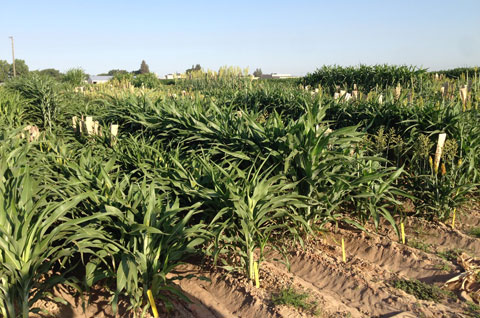UC Berkeley is leading a $12.3 million project funded by the U.S. Department of Energy to examine the role of epigenetics in allowing plants to survive in drought conditions, an increasing concern for agriculture as the effects of climate change are felt in California and globally.
UC Berkeley researchers will partner with scientists at UC Agriculture and Natural Resources, the Energy Department’s Joint Genome Institute and that agency’s Pacific Northwest National Laboratory on the five-year project, called Epigenetic Control of Drought Response in Sorghum, or EPICON.
The grant, announced today, comes in the midst of a historic drought in California. Over three years of field testing, researchers will dissect mechanisms by which sorghum, a close relative of corn, is able to survive water deprivation.
Peggy Lemaux, cooperative extension specialist at UC Berkeley’s Department of Plant and Microbial Biology, is heading the entire project. Co-investigators are Devin Coleman-Derr, Elizabeth Purdom and John Taylor from UC Berkeley; Jeffrey Dahlberg and Robert Hutmacher from UC Agriculture and Natural Resources; Chia-Lin Wei from the DOE Joint Genome Institute; and Christer Jansson from the Pacific Northwest National Laboratory.
“Historically, the genetic manipulation of crops, which has been critical to increasing agricultural productivity, has concentrated on altering the plant’s genetic sequence, encoded in its DNA,” said Lemaux. “However, recent studies have shown that environmental stresses – in our case drought – can lead to epigenetic changes in a plant’s genetic information. Because epigenetic changes occur without altering the underlying DNA sequence, they allow plants to respond to a changing environment more quickly.”
Over the next three years, a variety of observable plant traits will be followed, such as plant height and grain yield. In addition, leaf and root samples will be taken to investigate responses to drought at the molecular level, including how gene expression changes and which proteins and metabolites are altered.

